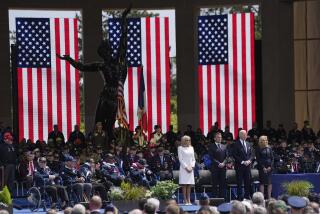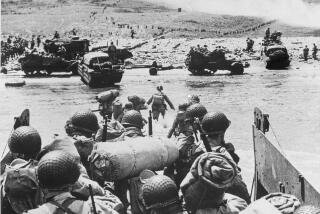Channel Ports Go All Out for D-Day--and the Tourist Dollar : England: Hotels, pubs, museums, transport firms--all hope to capitalize on the 50th anniversary of the wartime invasion.
- Share via
POOLE, England — The strains of Glenn Miller’s “In the Mood” waft from an old radio under the canvas tent decked out as a field kitchen, with tin plates and cups on G.I. tables, and a server dressed in a blue boiler suit, her hair swathed in a makeshift turban.
The kitchen re-creates the scene on D-day, June 6, 1944, in this Dorset port city from which thousands of American troops sailed for France 50 years ago. The prices, however, are up to date--75 cents for a cup of tea, $2 for a ham sandwich.
In nearby St. James Church, an old American flag hangs from the choir balcony; the 48-star ensign was a gift from the U.S. Coast Guard flotilla, known as the “St. Bernards of Normandy,” which shuttled on rescue missions between Poole and France.
Twenty-five miles west, in Weymouth, an impromptu museum of U.S. Army memorabilia has been set up in a shopping arcade, a selection of military items to mark the 50th anniversary that could keep the interested visitor occupied for an hour or so.
Outside, a U.S. olive-drab jeep and a staff car, manned by locals wearing period U.S. Army uniforms, tool around the port. Sitting in a pub is Mike Wall, 79, a grizzled, bright-eyed American D-day veteran who married a Weymouth girl and settled there permanently.
“My wife found me a great place here,” said Wall, once a medic with the 1st Infantry Division. “I’ve been living happily ever after.”
In the months before D-day, Americans seemed to be everywhere in southern England: the troops who would land on the beaches of Normandy; the supply corps to back them up; the sailors to ferry them across the English Channel; the airmen to support them from above.
All in all, more than a million and a half Yanks made their way through the southern counties of Hampshire, Dorset and Devon. They were joined by an equal number of British and Canadian servicemen. The Channel ports of Portsmouth, Southampton, Gosport, Weymouth, Portland and Poole were the main embarkation points for the invasion.
In the initial D-day landings, 156,000 troops took part. By the end of the invasion July 3, not quite one month later, 1 million troops had been put ashore.
Now, as the 50th anniversary of the greatest amphibious landing in history looms, local residents are bracing for a new flood of outsiders. Counting on the nostalgia that southern England’s towns, villages and bases will evoke among invasion veterans and their families, local tourism officials expect to lure back this summer about 350,000 visitors, many of them from the United States and Canada. Hotels, pubs, museums, exhibitions, resorts, transport companies--all hope to capitalize on the commemoration.
Portsmouth alone expects 70,000 visitors on June 4 and 5 to watch Queen Elizabeth II, on board the royal yacht Britannia, review the fleet with President Clinton, kings, queens and politicians--and then sail as part of a massive flotilla for the Normandy coast to take part in ceremonies on June 6.
U.S. warships will pay courtesy calls on Channel ports of southern England between June 2 and 5.
Local organizers are supported by the Ministry of Defense and veterans associations, which are helping with military events, as well as the Department of National Heritage, which is underwriting some less martial observances.
In British Prime Minister John Major’s words, the 50th anniversary is “a huge national event.”
“D-day was not just about those who took part on the day,” Major said. “It was made possible by the effort and sacrifice of men and women throughout the forces, throughout industry and throughout our nation.”
Major decreed that church bells “from St. Paul’s Cathedral to the smallest rural parish” will peal on the eve of D-day’s anniversary.
But the prime minister’s efforts to make the anniversary a national occasion have not been without controversy. Veterans complained about the carnival nature of some of the events. As a result, the observances have been muted and made less triumphal. And some events--a Spam-frying contest to recall wartime rations, for instance--were summarily dropped.
The national Tourism Board has published and circulated a detailed guide to about 350 commemorative events in southern England and Normandy; there are about 500 events nationally. Dozens of other brochures have been prepared focusing on various aspects of the D-day observances and history: for example, “Americans in Dorset,” the story of U.S. forces based there during the invasion buildup.
Tourism officials are not shy about promoting their attractions. “Selling the South” has become the D-day anniversary slogan for the Southern Tourist Board, which has established a full-time D-day coordinator in New York and a national information hot line in Britain.
“We hope to realize an extra $9 million in tourism revenue from the commemoration,” said Peter Smith of the tourist board. “We hope spending by American and Canadian visitors alone will top $3 million.”
The variety of exhibits and observances is staggering. Here is a small sampling:
* Sightseeing flights in a DC-3 over former bases--or Normandy--from Bournemouth.
* Radio D-day in Poole and Christchurch, which will broadcast for 12 hours a day, re-creating wartime news bulletins and music.
* A parade, church service and wreath-laying at the American memorial in Portland.
* A display in Lyme Regis about the memories of U.S. troops who trained in the town.
* The largest display of wartime vehicles ever assembled--1,100 tanks, trucks, jeeps, motorcycles, even a locomotive--in Portsmouth.
* A D-day air show in Middle Wallop, Hampshire.
* A display at Southwick House in Southwick, which served as the forward headquarters for the commanders of “Operation Overlord,” as the invasion was formally known: American Gen. Dwight D. Eisenhower and British Gen. Bernard Law Montgomery.
Meanwhile, BBC-TV is tooling up for its biggest outside broadcasting operation since the wedding of the Prince and Princess of Wales in 1981. The anniversary events in the Channel and Normandy will receive 13 hours of live coverage.
About 55 cameras will be positioned in Portsmouth for the opening commemorative services on June 4 and 5. And the Channel crossing will be transmitted from the pitching decks of ships carrying dignitaries and veterans to the nation’s television sets.
Such has been the mounting interest in the events and memorabilia of 50 years ago that groups such as the Southern Tourist Board are preparing to gear up all over again--for next year’s 50th anniversary of Victory in Europe Day.
More to Read
Sign up for The Wild
We’ll help you find the best places to hike, bike and run, as well as the perfect silent spots for meditation and yoga.
You may occasionally receive promotional content from the Los Angeles Times.






